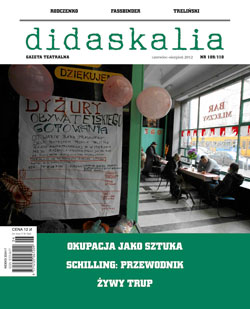
Fałszywe tropy. Z Michałem Buszewiczem rozmawia Monika Kwaśniewska
Buszewicz discusses his work on the text and performance of Crime, revealing the principles underlying his collaboration with Ewelina Marciniak, the stage designer, Marta Stoes, and the actors from the Polski Theatre in Bielsko-Biała. He talks about his inspiration from films, lectures, and also from the field of logic. He also devotes a lot of focus to the planned reaction between the stage and the viewer.
More...